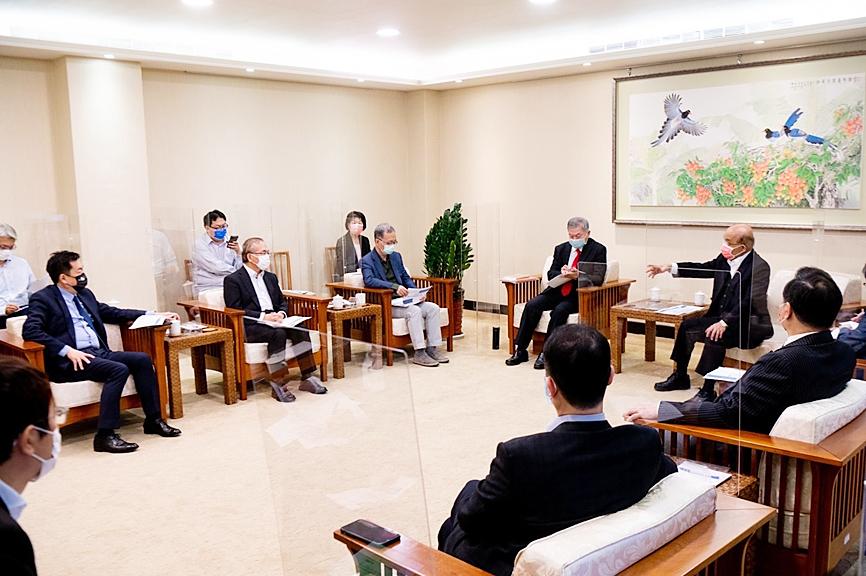About 35,500 rooms are expected to be available at quarantine hotels and centralized quarantine facilities for Taiwanese returning to the nation from abroad between Dec. 14 and Feb. 14, up from 29,600 rooms announced previously, the Central Epidemic Command Center (CECC) said yesterday.
Minister of Transportation and Communications Wang Kwo-tsai (王國材) early this month said 26,000 rooms were available at quarantine hotels and that the CECC planned to make 3,600 rooms available at government quarantine facilities.
The center announced the capacity expansion at an inter-ministerial meeting on COVID-19 prevention at the Executive Yuan yesterday morning.

Photo courtesy of the Executive Yuan
The CECC told the meeting that COVID-19 cases and deaths are increasing globally, Executive Yuan spokesperson Lo Ping-cheng (羅秉成) said in a news release.
The domestic COVID-19 situation is under control, but the circumstances in many neighboring nations are severe, the CECC said.
Most of the recently imported COVID-19 cases had been infected with the Delta variant of SARS-CoV-2, it said, as it urged people to remain vigilant and called for the continuation of tight border control controls.
The CECC would this week announce its decision whether to extend or downgrade a level 2 COVID-19 alert on Tuesday next week, said Centers for Disease Control (CDC) Deputy Director-General Philip Lo (羅一鈞), deputy chief of the CECC’s medical response division.
Minister of Health and Welfare Chen Shih-chung (陳時中), who heads the CECC, has said the alert level would be lowered along with an easing of border controls.
However, as the government is about to implement new quarantine measures for the Lunar New Year holiday, the alert level is unlikely to be lowered soon, he said.
Separately yesterday, Chen said the center is working toward administering a third dose of a COVID-19 vaccine as a booster shot next year, adding that frontline healthcare workers, airport workers and high-risk groups would be prioritized.
The plan is for people to receive a third dose of the same brand of vaccine as their first two doses, he said, adding that the details would be discussed by specialists.
Booster shots would be voluntary, Chen said.
CDC Deputy Director-General Chuang Jen-hsiang (莊人祥), who is the CECC’s spokesman, said the details would be discussed by the Advisory Committee on Immunization Practices meeting this month.
The government has signed a contract with Moderna to purchase 20 million doses of its COVID-19 vaccine or an updated variant booster vaccine candidate, which would be offered as a third shot, Chuang said.
Negotiations to purchase more AstraZeneca and Pfizer-BioNTech vaccines are ongoing, he added.
The CECC yesterday reported three imported COVID-19 cases in travelers who arrived from Germany, Indonesia and Malaysia.
Two of the cases are vaccine breakthrough infections, while the other had two doses of a COVID-19 vaccine after contracting the disease in July, Chuang said.
Additional reporting by CNA, with staff writer

Taiwanese actress Barbie Hsu (徐熙媛) has died of pneumonia at the age of 48 while on a trip to Japan, where she contracted influenza during the Lunar New Year holiday, her sister confirmed today through an agent. "Our whole family came to Japan for a trip, and my dearest and most kindhearted sister Barbie Hsu died of influenza-induced pneumonia and unfortunately left us," Hsu's sister and talk show hostess Dee Hsu (徐熙娣) said. "I was grateful to be her sister in this life and that we got to care for and spend time with each other. I will always be grateful to

REMINDER: Of the 6.78 million doses of flu vaccine Taiwan purchased for this flu season, about 200,000 are still available, an official said, following Big S’ death As news broke of the death of Taiwanese actress and singer Barbie Hsu (徐熙媛), also known as Big S (大S), from severe flu complications, the Centers for Disease Control (CDC) and doctors yesterday urged people at high risk to get vaccinated and be alert to signs of severe illness. Hsu’s family yesterday confirmed that the actress died on a family holiday in Japan due to pneumonia during the Lunar New Year holiday. CDC Deputy Director-General Tseng Shu-hui (曾淑慧) told an impromptu news conference that hospital visits for flu-like illnesses from Jan. 19 to Jan. 25 reached 162,352 — the highest

TAIWAN DEFENSE: The initiative would involve integrating various systems in a fast-paced manner through the use of common software to obstruct a Chinese invasion The first tranche of the US Navy’s “Replicator” initiative aimed at obstructing a Chinese invasion of Taiwan would be ready by August, a US Naval Institute (USNI) News report on Tuesday said. The initiative is part of a larger defense strategy for Taiwan, and would involve launching thousands of uncrewed submarines, surface vessels and aerial vehicles around Taiwan to buy the nation and its partners time to assemble a response. The plan was first made public by the Washington Post in June last year, when it cited comments by US Indo-Pacific Commander Admiral Samuel Paparo on the sidelines of the Shangri-La Dialogue

Suspected Chinese spies posing as Taiwanese tourists have been arrested for allegedly taking photographs of Philippine Coast Guard ships, local media reported. The suspected spies stayed at a resort in Palawan, where from a secluded location they used their phones to record coast guard ships entering and leaving a base, Philippine TV network GMA said on Wednesday. Palawan is near the Spratly Islands (Nansha Islands, 南沙群島) and other disputed areas of the South China Sea, where tensions have been on the rise between China and the Philippines. The suspects allegedly also used drones without permission and installed cameras on coconut trees in the